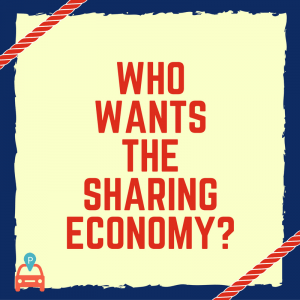Is the concept of a sharing economy a solution to traffic congestion and downtown parking shortages in metropolitan areas? If automobiles and transportation become part of a shared economy model, will this also reduce less demand for parking lots and parking spaces? Will cities like Chicago and Los Angeles become easier to navigate and air quality improve? What is the likelihood for a sharing economy to become a reality in the future and transform how we drive and park?

Who Has Economic Power
To understand future economic trends, it is important to understand who holds the power to move the economy. Presently there are more than 80 million consumers identified as the Millennial Generation. That is about 25% of the U.S. population. As consumers, they spend more than $200 billion annually. That is a significant interest to the nation’s consumer economy where automakers, transportation and parking start-up entrepreneurs are concerned. But consider how their influence may actually be greater.
Not only do Millennials control spending for their own personal needs and wants, but many are young, budding families. They are grooming the spending habits of the next generation with the children they are raising. Many people envision a stereotype version of Millennials who are young, hip and childless. The reality is that more than 22 million Millennials are raising children. On average, about 9,000 babies are born to Millennial parents daily. That is an incredible influence for shaping a future economy. If Millennials are already using their influence to reshape the face of our economy with their own interests like peer-to-peer ride sharing, might their children be accustomed to peer-to-peer parking as the norm when they are adults? But an upcoming generation is not where a Millennial’s economic might stops.
Millennials were born to a generation of adults who, through medical advances and social awareness, are one of the healthiest and longest-lived elder generations our country has ever seen. That means Millennials are also going to be responsible for their care as they age. Many Millennials already bear that responsibility. One of the strongest trends among the elderly is a desire to age in place. A Millennial’s caregiving responsibility includes managing mom and dad’s finances. As of this year about 19% of Millennials were already caring for elderly parents. That means Millennials are adding one more demographic to their list of economic interests they manage and represent.
Who Are These Economic Powerhouses?
When all the economic puzzle pieces are put together, the big picture is clear. Millennials will eventually control the vast majority of consumer spending for all Americans, young and old. Companies realizing this are already discovering what it is these consumers want. This concentrated economic power is leading U.S. businesses to reshape their strategies. One reason is because Millennials have broken traditional molds with regard to consumers of the past. Typically, Millennials are well educated, career oriented, politically active, socially progressive and become strongly loyal to the brands they choose. And sharing economy parking is something they may be strongly interested in.
What Drives Their Consumerism?
They tend to be unaffected by traditional marketing strategies because Millennials crave authenticity. They are more likely to research personal reviews rather than market and industry news before buying a product. With regard to transportation and parking issues being solved by a sharing economy, this may very well be a trend that will succeed. In research performed by automakers, 96% of Millennials indicated they prefer peer-to-peer ride share transportation models to owning or leasing a car.
A New Love Affair
The auto industry has already recognized that Americans are driving fewer miles. If a generation comes along that falls out of love with the concept of car ownership, opting for a romance of a shared economy that is more fiscally and ecologically responsible, the parking lot business will have to wonder what this will mean for their own industry. If peer-to-peer ride rentals are what interests the drivers and riders controlling a national economy, long-term parking and on demand parking may have to innovate with their traditional business models to capture this new market dynamic.
Join The Sharing Economy Revolution
Don’t get left behind by a parking lot industry transformation. For more details please contact us and succeed as a part of a future sharing economy parking revolution that is happening today.

